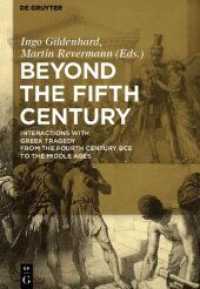- ホーム
- > 洋書
- > 英文書
- > Science / Mathematics
基本説明
Describes an innovative approach to the assessment of scientific inquiry. The approach is termed active assessment and is based on the idea that scientist-educators can create authentic assessments that enhance engagement in the educational process and provide meaningful assessment data on student learning. This book deals with a specific educational context – the in-laboratory, scientific inquiry, educational program - and addresses ways to assess knowledge development and outcomes within this setting.
Full Description
Four types of knowledge are signi?cant for the de?nition of a speci?c s- enti?c inquiry program: cognitive knowledge, physical knowledge, represen- tional knowledge, and presentational knowledge.







